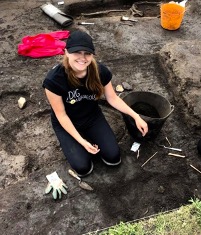
Jordan Roberson
- Expert Role: Field Expert & Mapping Expert
- Major: Human Biology
- Class: Graduate Student
- Hometown: Battle Creek, MI
Why is this humanitarian work important to you?
In life, I always try to help people in whatever way I am able. I’m very fortunate to be in the situation I am in and cannot even fathom the hardships migrants face while having to make this journey. The opportunity to apply the skills I have learned to reunite people with their loved ones is invaluable. Everyone deserves basic human rights and respect, and I want to do everything I can to ensure that those with whom I come into contact with are granted those primary liberties.
What do you hope to gain from this experience?
I hope to gain a new, very important, perspective on the humanitarian crisis taking place on the Texas-Mexico border. I have had some exposure through viewing the Missing in Brooks County documentary, reading blog posts of past team members, and speaking with my peers while at UIndy; however, those experiences are incomparable to actually being there myself. I hope to learn a great deal and take that knowledge home with me and share it with individuals back home.
What are some of the biggest challenges you will face while in Texas?
Some of the biggest challenges I feel I will face in Texas are both physical and emotional. I am from the northern region of the country and am very used to the cold. Going to Texas in May is going to be quite a temperature adjustment. I also feel that being removed from the crisis at the border definitely creates a shield emotionally. By removing that shield, I imagine the emotional adjustment will be somewhat difficult, but I am happy to deal with any discomfort in order to offer any help I can while in Falfurrias.
What’s one thing people probably don’t know about you until they’ve known you a long time?
Can nap anywhere. Will nap anywhere.
When did you know you wanted to pursue human biology as a degree, and how did you become interested in forensics?
I have always been interested in science and working with people in some capacity. When I started my bachelor’s degree, I had no idea what I wanted to major in. During my sophomore year, I took a biological anthropology class and fell in love. From there I declared my major as anthropology, concentrating in forensic anthropology. By continuing with a degree in human biology, I am able to utilize my knowledge of anthropology and biology and get a holistic view of both fields and how they can work hand-in-hand.
What advice would you give other students interested in pursing a human biology degree at UIndy?
I would tell other students that UIndy is a great program that draws in students from all over the country, each with their own perspectives and experiences. Being able to learn with and from so many different people is amazing and really adds to the varied and extensive education one receives while here.
What makes UIndy’s human biology program distinctive? The human biology program is distinctive because of the variety of classes, ability to participate in casework, and many other opportunities that are advantageous to an individual pursuing forensic anthropology. Many of the experiences provided by UIndy are not found at any other university. These aspects lend themselves to continued success as a student, scientist, and individual.